News & Stories
2017
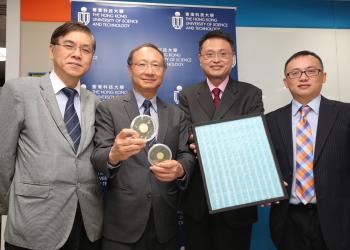
News
HKUST Develops Novel Air Purification Technology that Removes Deadly Airborne Viruses
Researchers at The Hong Kong University of Science and Technology (HKUST) have developed an air purification system that removes up to 99.999 per cent of airborne bacteria and viruses, including influenza (H1N1, H3N2), EV71 and MERS-Cov (Middle East Respiratory Syndrome Coronavirus) that had caused hundreds of deaths across the Middle East and Asia two years ago.
“Our technology effectively combats and inhibits the growth of bacteria, germs or viruses that cause respiratory diseases, offering solutions to protect one's health,” Prof Yeung King-lun, Associate Dean of Research and Graduate Studies from HKUST School of Engineering, said. “We must extend our heartfelt gratitude to Haven of Hope Christian Service, which has put our system on trial in its Holistic Care Centre for 18 months. This is the result of long cooperation among HKUST, industry and the government.”
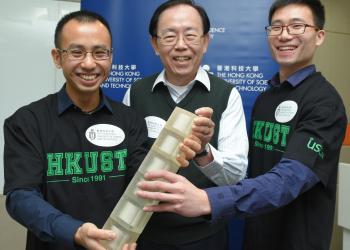
News
HKUST Researchers Create Solid Metamaterials with Fluid-like Property that Can Be Used for Wave Filtering and May Help Protect Buildings from Earthquakes
The Hong Kong University of Science and Technology (HKUST) researchers have successfully created solid composite materials with the unique wave property of fluid, a property of which forbids the transmission of transverse waves. The transverse waves can lead to destructive horizontal shaking during earthquake. Such composite, also called “metamaterials”, can be used for wave filtering and vibration control, and may eventually provide an alternative earthquake proofing solution as well as improve the efficiency of medical ultrasound transducers.

News
ORCID Identifiers in the HKUST Research Community
ORCID is a non-profit, cross-disciplinary effort to create and maintain a Registry of unique and persistent researcher identifiers. By the end of 2016, close to 3 million ORCID iDs have been created. Research funders and institutions worldwide are joining the effort to integrate ORCID iDs into their systems. At HKUST, EVPPO is requiring all faculty to have ORCID iDs and connect them to the HKUST Scholarly Publications Database (SPD).
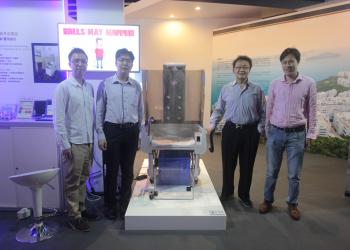
News
Bathing for Elderly made Easy
Illustrating the innovation at work at HKUST, Prof Neville Ka Shek Lee and his design team consisting of HKUST alumni have devised a novel way for seniors to wash in greater safety while retaining their independence
The bathroom can be a dangerous place especially when you are a senior. The US National Institute of Aging has found that more than one in three aged 65 and over fall each year, with 80% taking place there. Heart attacks, scalding and fainting are other incidents that can frequently occur while bathing.
2016

News
HKUST Researchers Develop Novel Audio Technology and Sales Model that Bring More Affordable and Better-performed Hearing Aids
Researchers from The Hong Kong University of Science and Technology (HKUST) have developed an intelligent hearing aid which not only allows users to adjust the clarity of selected sound sources, but is also much more affordable at just one tenth the price of similar products in the market.Developed by Prof Richard So from the Department of Industrial Engineering and Logistics Management and his student Calvin Zhang, fresh graduate of MPhil Program in Technology Leadership and Entrepreneurship (TLE), the novel audio technology not only promises to improve life for the elderly and the hearing-impaired, but will also enhance the audio quality of hearing protection equipment and communication devices such as mobile phones and walkie-talkies, as well as the accuracy of voice recognition devices.
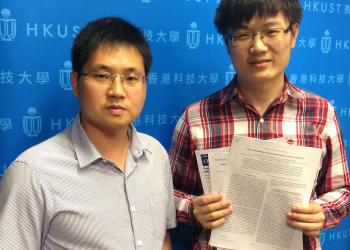
News
HKUST Committed to Nurturing Young Research Talents Three Undergraduates Publish Paper in Nature Communications
The Hong Kong University of Science and Technology (HKUST) is dedicated to nurturing students’ passion and interests in research. Three undergraduate students have recently discovered a method that could make production of entangled photon pairs (biphotons) – an essential element for quantum communication and quantum network – much easier and cheaper, taking popularization of such next-generation communication a step closer to reality.
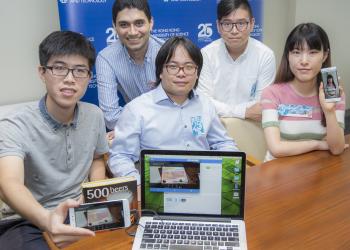
News
HKUST Builds Frameworks to Boost Development of Mobile Applications on Augmented Reality
Augmented Reality (AR) is the next big thing for mobile devices. Researchers at The Hong Kong University of Science and Technology (HKUST) are on course of building a novel AR platform for mobile devices, in efforts to facilitate an ecosystem for entrepreneurs and programmers to develop AR programs and applications on mobile and wearable devices.
Prof Pan Hui, Director of HKUST-DT System and Media Lab (SyMLab), said the lab resolved to a bottom-up approach in its research to facilitate the development of AR applications on mobile and wearable devices. “We sought to identify and develop major AR components including hardware platforms, software frameworks and display devices, then we enable technologies such as object tracking and process offloading to significantly accelerate the development cycle,” he said.
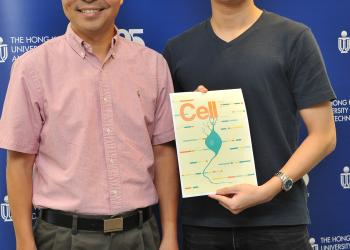
News
HKUST Researchers Find Possible Mechanisms of Human Brain Disorders That May Shed Light on New Treatments
A research team led by Prof Mingjie Zhang, Kerry Holdings Professor of Science of the Division of Life Science at The Hong Kong University of Science and Technology (HKUST), has achieved a breakthrough that provides mechanistic insights into the causes that lead to various neuropsychiatric disorders such as autism, intellectual disorders (ID) and schizophrenia. With their discoveries, new treatments for these disorders may be developed in near future.
All neurons in our brain are wired via a micron-sized connection unit called synapse, and each synapse contains a layer of densely-packed, protein-rich compartment called postsynaptic density (PSD), which is responsible for brain signal processing and transmission. While the existence of PSDs has been known to scientists for 60 years, how PSDs form and change in response to brain activities are poorly understood.






